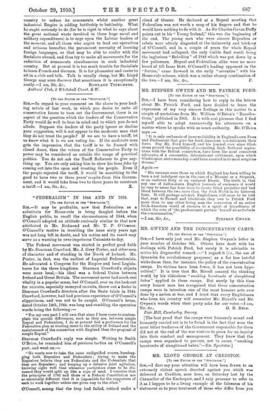" FEDERALISM " IN 1844 AND IN 1910.
[To THE EDITOR OF THE " SPECTLT011."] Sra,—It may be profitable, now that Federalism as a substitute for Home-rule is being dangled before the English public, to recall the circumstances of 1844, when
O'Connell adopted an attitude curiously similar to that now attributed to Mr. Redmond and Mr. T. P. O'Coinor. O'Connell's motive in troubling the issue sixty years ago was not long left in doubt, and his action and its result may serve as a warning to over-impetuous Unionists to-day.
The Federal movement was started in perfect good faith by Mr. Sharman Crawford, Mr. J. Grey Porter, and other men of Character and of standing in the North of Ireland. Mr. Porter, in fact, was the earliest of Imperial Federationists. He advocated a Congress for the Empire and local Legisla-
tures for the three kingdoms. Sharman Crawford's objects were more local,—his ideal was a federal Union between Ireland and Great Britain. The movement never had much real vitality in a popular sense, but O'Connell, ever on the look-out for recruits, especially moneyed recruits, threw out a feeler in Sharman Crawford's direction after the State trials in 1844. Crawford, however, had had previous experience of O'Connell's slipperiness, and was not to be caught. O'Connell's letter, dated October 14th, 1844, was long and rambling, the operative words being the following :—
"For my own part I will own that since I have come to contem- plate the specifio differences, such as they are, between simple Bepeal and Federalism, I do at present feel a preference for the Federative plan as tending more to the utility of Ireland and the maintenance of the connection with England than the proposal of simple RepeaL" Sharman Crawford's reply was simple. Writing to Smith O'Brien, he reminded him of previous tactics on O'Connell's
part, and went on :-
"He wants now to take the same undignified course, humbug- ging • both Repealers and Federalists; trying to make the Repealers believe they are Federalists and the Federalists that they are Repealers ; and keeping up a delusive joint agitation, knowing right well that whenever particulars come to be dis- cussed they would split up like a rope of sand. I conceive that the principles of 1782 and those of a Federal Constitution are so essentially different that it is impossible for the supporters of each to work together unless one gives way to the other."
O'Connell, seeing that the trap had failed, retired under a cloud of bluster. He declared at a Repeal meeting that Federalism was not worth a snap of his fingers and that he would have nothing to do with it. As Sir Charles Gavan Duffy points out in his "Young Ireland," this was the beginning of the end. The young men who were sincere Repealera or rebels were utterly disgusted at the insincerity and trickery of O'Connell, and in a couple of years the whole Repeal movement had collapsed, the only visible final result being the inglorious " Rebellion " of 1848 which was put down by a few policemen. Repeal and Federalism alike were no more heard of till Isaac Butt, O'Connell's leading opponent in the " forties," came forward in the early " seventies " with his Home-rule scheme, which was a rather clumsy combination of














































 Previous page
Previous page